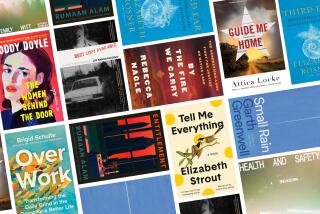BOOK REVIEW : Passage of Time and Losses in Life : SEPTEMBER SONG: Stories, <i> by William Humphrey,</i> Houghton Mifflin/Seymour Lawrence; $19.95; 258 pages
- Share via
“September Song,” one of the stronger stories in this newest collection by William Humphrey, recounts the thrill a woman finds on being asked, at the age of 76, to divorce her unresponsive husband and marry her true love from 20 years past.
It’s the name of the story more than the story itself, however, that makes “September Song” an appropriate title for this book, because most of the tales concern losses brought by the passage of time: losses of sight, hearing, health, family, independence, life itself. Some of the stories are trivial, to put it charitably, but others are affecting--invariably the longer stories, where Humphrey’s characters aren’t trapped by the authorial conceit that brought them into being in the first place.
Head and shoulders above the other stories in quality is “The Apple of Discord,” told by a New York apple farmer on the wedding day of his youngest daughter. It’s a version of the Lear fable--but with a significant twist, for Seth Bennett’s problem is that none of his daughters want to inherit his kingdom, namely the family apple farm.
Ellen has married a preacher, Doris a mortician, and Janet, having defied all her father’s efforts to fix her up with the farm’s manager, Peter Jeffers, is about to marry yet another non-farmer. Janet knows, like her sisters, that farming is a life of unending work and worry, and is only insulted by her father’s pushing Peter by saying, “There’s a lot to be said for being brighter than your husband.”
One of the things that makes “The Apple of Discord” interesting is that Seth’s attempts to stage-manage his daughters’ love lives go contrary to his personality. He’s no Neanderthal: a good, thoughtful liberal, Seth has happily paid for his daughters’ college educations and simply can’t understand why his children haven’t come around to his point of view--realized that apple farmers are born, not made, that they have no real choice in the matter. “You inherited it,” Seth tells himself. “Maybe through a strain from that original couple Adam and Eve. And because your forebears had endured its hardships for your sake you owed it to them to endure what they had endured. . . . Ah, if only an apple would fall on Janet’s head, teach her the law of gravity, and tie her down to her native soil!”
Seth tries to show Janet the depth of his concern about the farm by buying an inscribed headstone for himself and listing the property with a real estate agent. Those ruses fail miserably, however--indeed, the latter backfires, for Janet becomes engaged to the real-estate agent. Developers, meanwhile, have made increasingly large offers for the farm, and when none of the daughters undergo a sudden change of heart, Seth loses his will to fight. He accepts the highest bid for the farm, which results in the worst possible consequence for Seth: In attempting to save the farm, he has actually betrayed it. As Seth explains the sale to various neighbors, he finds himself feeling, to his bitter surprise, “like Gen. Sherman marching through Georgia, or like Gen. Sherman might have felt if confronted by Scarlett on the doorsteps of Tara.”
Though “The Apple of Discord” is a fine story, it exhibits many of the tics in Humphrey’s writing style--tics that give the collection a certain sameness. There’s the unsubtle plot, for example, as if Humphrey believes a story should always be “about” something, and the reliable, old-fashioned conclusion, which the reader will likely have anticipated well in advance.
“September Song” is a quick and easy read, but it seems longer than it is because the lesser stories diminish the handful that linger in memory.
More to Read
Sign up for our Book Club newsletter
Get the latest news, events and more from the Los Angeles Times Book Club, and help us get L.A. reading and talking.
You may occasionally receive promotional content from the Los Angeles Times.







